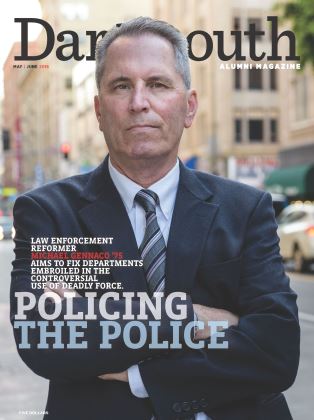Humorist Gina Barreca ’79 has been writing fierce and funny for more than 20 years, but her latest book reads wiser and more eloquent. “We get braver as we get older, and it’s time to tell the real stories,” she tells DAM. Embedded within the dark humor that marks many of her essays, such as “Words Rich People Use That Poor People Don’t” (“amuse-bouche” and “thread count”), lie moments of empathy and experience. Barreca explores why work is an essential part of life’s conversation, the value of taking sides and embracing beliefs, and what a dying parent might discuss with a child. The author’s own mother died when she was 16 and, in an eight-point list, she shares wrenching, hard-won advice with “Questions I Wish I’d Asked.” (To read an excerpt from the book, visit dartmouthalumnimagazine.com.)
An English and feminist theory professor at the University of Connecticut, Barreca teaches creative writing and a course on the British novel. If You Lean In is her 10th book of humor and cultural commentary. She has edited another 13 books and writes a weekly column for The Hartford Courant. With Babes in Boyland: A Personal History of Co-education in the Ivy League (2011) she offered a frank look at gender and education based on her experiences at Dartmouth in the late 1970s.
“American women have become less worried about enjoying and displaying our humor but more worried about acknowledging and exercising our ambition and power,” says Barreca. “When I was at Dartmouth in the middle-to-late 1970s, women thought we would be more well-represented in government, the judiciary, on boards of directors, in positions of corporate governance. I didn’t think we’d still be saying, ‘It’s just me,’ when we announced who we were on the phone.” Despite these setbacks, Barreca remains confident in the cultural evolution she tracks. “I am optimistic that what I call ‘the Tribe of Loud, Smart Women’ will grow in numbers and will, eventually, undermine the pious earnestness and whining sense of entitlement that forces humorless pedants to say things like, ‘Who needs feminism anymore? I’m a humanist.’ Not that I’m bitter.”
 View Full Issue
View Full Issue
More From This Issue
-
 COVER STORY
COVER STORY“Out of Crisis Comes Opportunity”
May | June 2016 By ANDREW FAUGHT -
 Feature
FeatureIn the Crossfire
May | June 2016 By FAY WELLS, TU’06 -
 Feature
FeatureFirst
May | June 2016 By Judith Hertog and Lexi Krupp ’15 -
 FEATURE
FEATURERemnants of a Moment
May | June 2016 By GAYNE KALUSTIAN ’17 -
 Feature
Featureclassnotes
May | June 2016 -
 INTERVIEW
INTERVIEWAnnette Gordon-Reed ’81
May | June 2016 By JULIA M. KLEIN
Alumni Books
-
 ALUMNI BOOKS
ALUMNI BOOKSERIC DEZENHALL ’84 Strange Bedfellas
JANUARY | FEBRUARY 2025 By Kevin Nance -
 ALUMNI BOOKS
ALUMNI BOOKSROBERT C. BORDONE ’94 Bridging the Divide
MAY | JUNE 2025 By Kevin Nance -
 ALUMNI BOOKS
ALUMNI BOOKSJAKE TAPPER ’91 Political Hubris
JULY | AUGUST 2025 By Kevin Nance -
 Alumni Books
Alumni BooksBittersweet Goodbye
JULY | AUGUST 2017 By Lisa Furlong


